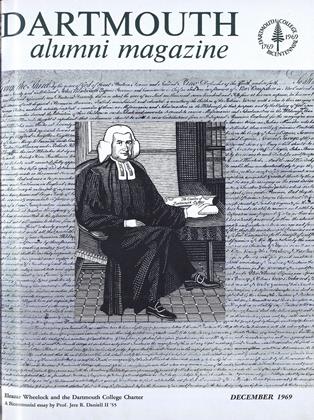By Earl M.Rauch '71. New York: Doubleday & Co.Hardcover: $5.95; Paperback: $2.95.
A disciple of Confucius once told the Master he had dreamt he was a butterfly; when he awoke, he wasn't sure whether he was a man who had dreamt he was a butterfly, or really a butterfly who was now dreaming he was a man.
Such is the confounding of past, present, and future in Earl M. Rauch's first published novel, Dirty Pictures from the Prom, written last year when the author was a sophomore Briefly, the basis of the plot is the death of leukemia at age seven of Creynaldo Saltzer, an incredibly versatile genius - novelist, painter, philosopher, poet, musician - highly reminiscent of J. D. Salinger's Teddy. Creynaldo's younger brother, Barnaby, now grown to college age, recalls his life with Creynaldo - both before and after Creynaldo's death. Barnaby's hilarious and bittersweet adventures during his growing up, Catcher-in-the-Rye phase, are cleverly mixed with intense philosophical speculation about time, reality, and the people (invariably bizarre) who leave their impressions upon Barnaby's psyche.
Aside from the inevitable sexual hang-ups, the driving force in Barnaby's life is that he constantly "remembers" the events happening to him, as they happen - as if he were in the future somewhere looking back: this remembrance of things past forms the very sinews of the novel.
Naturally, being the brother of one of the great minds of the century, Barnaby is obsessed with finding his own life pattern, but Creynaldo in heaven and the other characters persist in intruding on his thoughts, and give him no peace. After his ascension into heaven, Creynaldo - brilliant mind that he is - is soon elected God, and the first act of his new Administration is to bring back Satan from exile. Seeing Creynaldo "on his perch atop the Carta Blanca beer sign," Barnaby realizes at last how great his brother really was. "After all," shrugs Barnaby, "isn't that the American way? Born of humble parents, he grew up to become God." Adding to the offbeat proceedings is a pungent dialogue, weaving in and out of the story, between author Barnaby and the editor, going over the "memoirs" for publication.
There is clearly much originality and imagination back of this book, and in his tale of two brothers Mr. Rauch has produced a novel which is wry and entertaining, quite entertaining. In the beginning, God had created heaven and earth; in the end, there was Creynaldo, Satan, and the Carta Blanca beer sign.
Mr. Caplan is a regular book reviewer andfeature writer for The Dartmouth.
 View Full Issue
View Full Issue
More From This Issue
-
 Feature
FeatureEleazar Wheelock and the Dartmouth College Charter
December 1969 By JERE R. DANIELL II '55, -
 Feature
FeatureEleazar: The Man Behind the Myth
December 1969 By John Hurd '21 -
 Feature
FeatureTHE WHEELOCK SUCCESSION
December 1969 -
 Feature
FeatureTV News Editor
December 1969 -
 Feature
FeatureMovie Producer
December 1969 By HAROLD BRAMAN '21 -
 Article
ArticleCharter of Dartmouth College
December 1969
Article
-
 Article
ArticleNamed Chief Justice
November 1934 -
 Article
ArticleSALMON P. CHASE, UNDERGRADUATE AND PEDAGOGUE
October 1919 By Charles R. Lingley -
 Article
ArticleSQUASH
FEBRUARY 1964 By DAVE ORR '57 -
 Article
ArticleOf What .... is a College?
January 1935 By The Editors -
 Article
ArticleThayer School
February 1952 By William P. Kimball '29 -
 Article
ArticleIt's Called "Alteration Reduplication"
MAY 1965 By WINTHROP WADLEIGH '23


